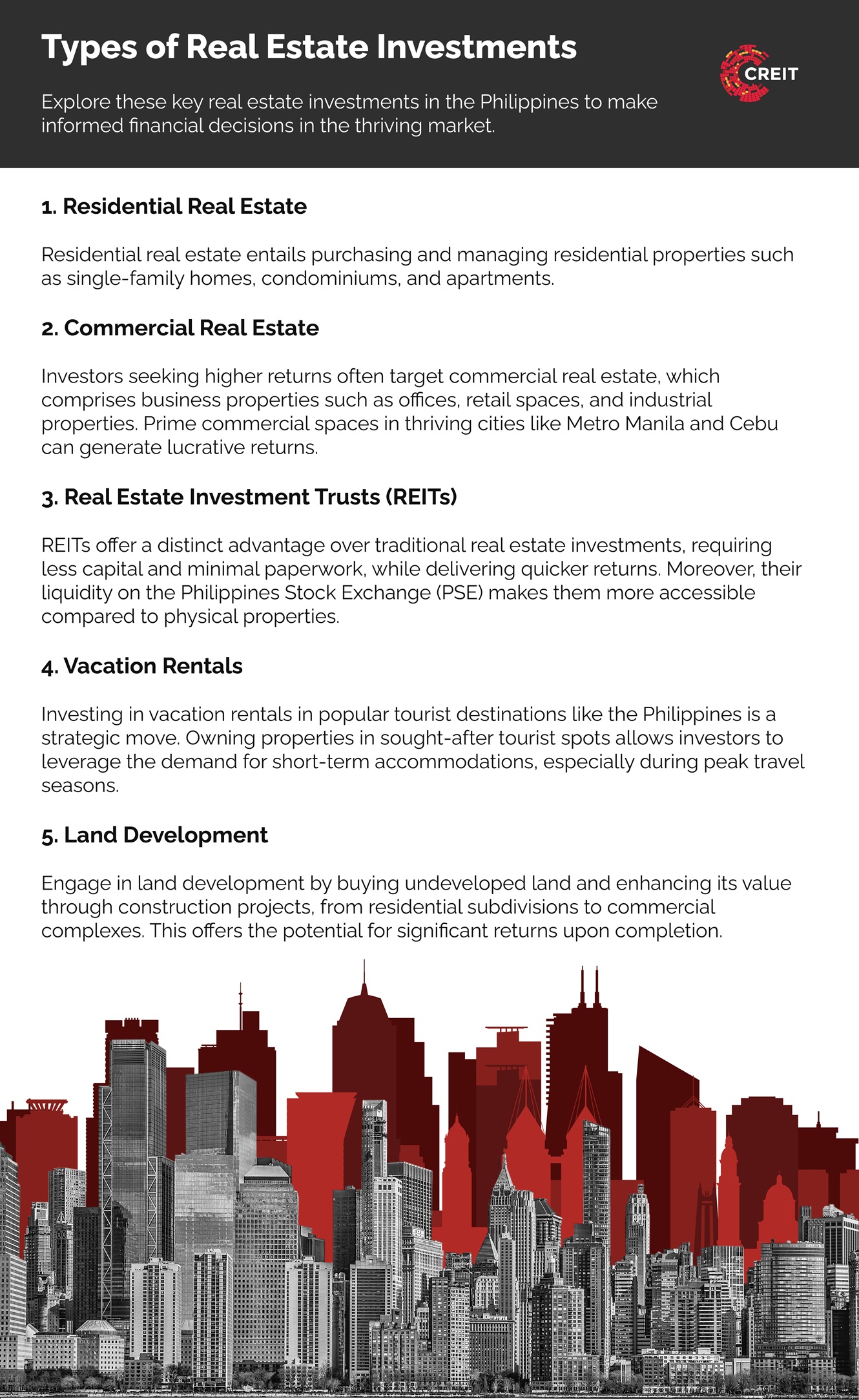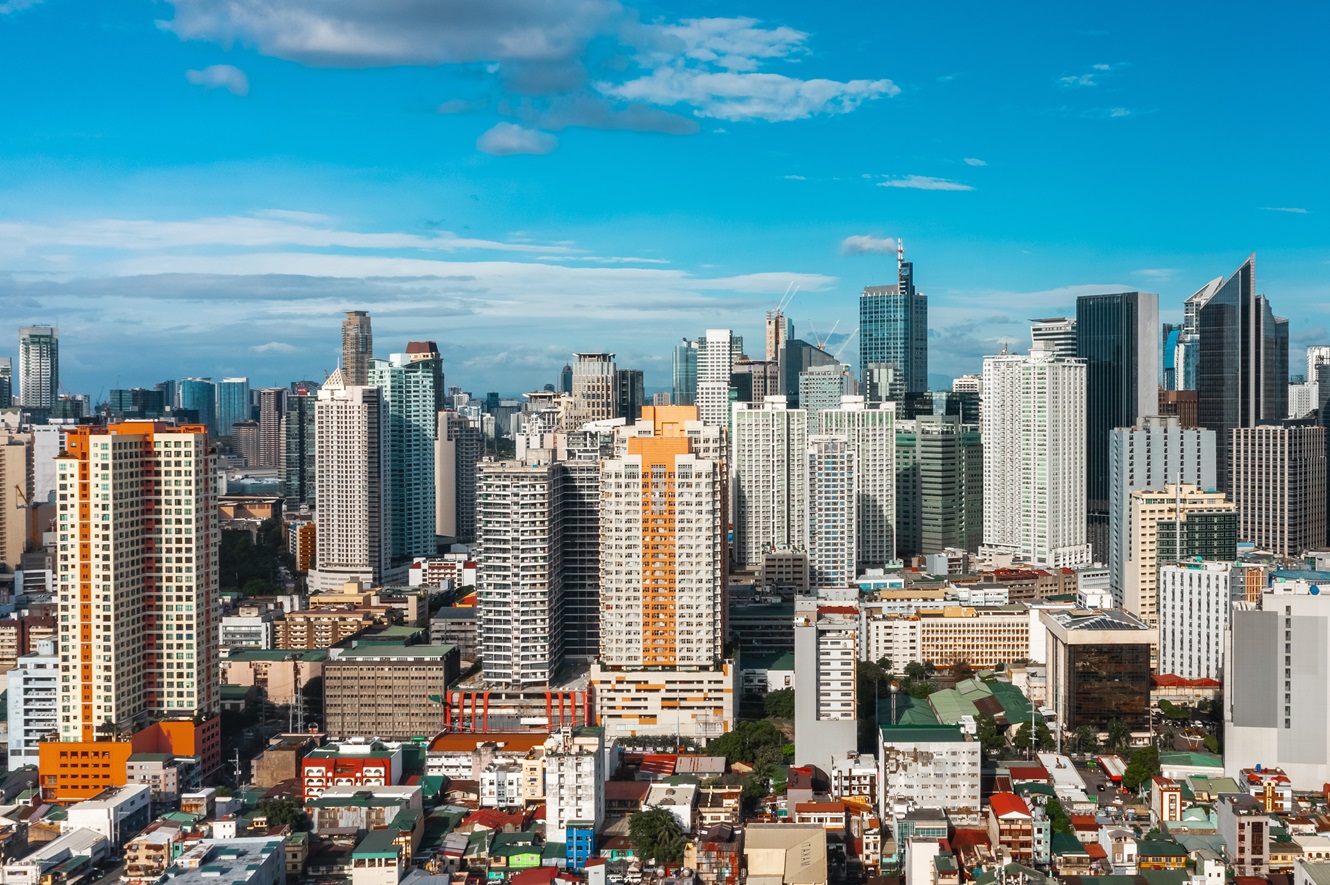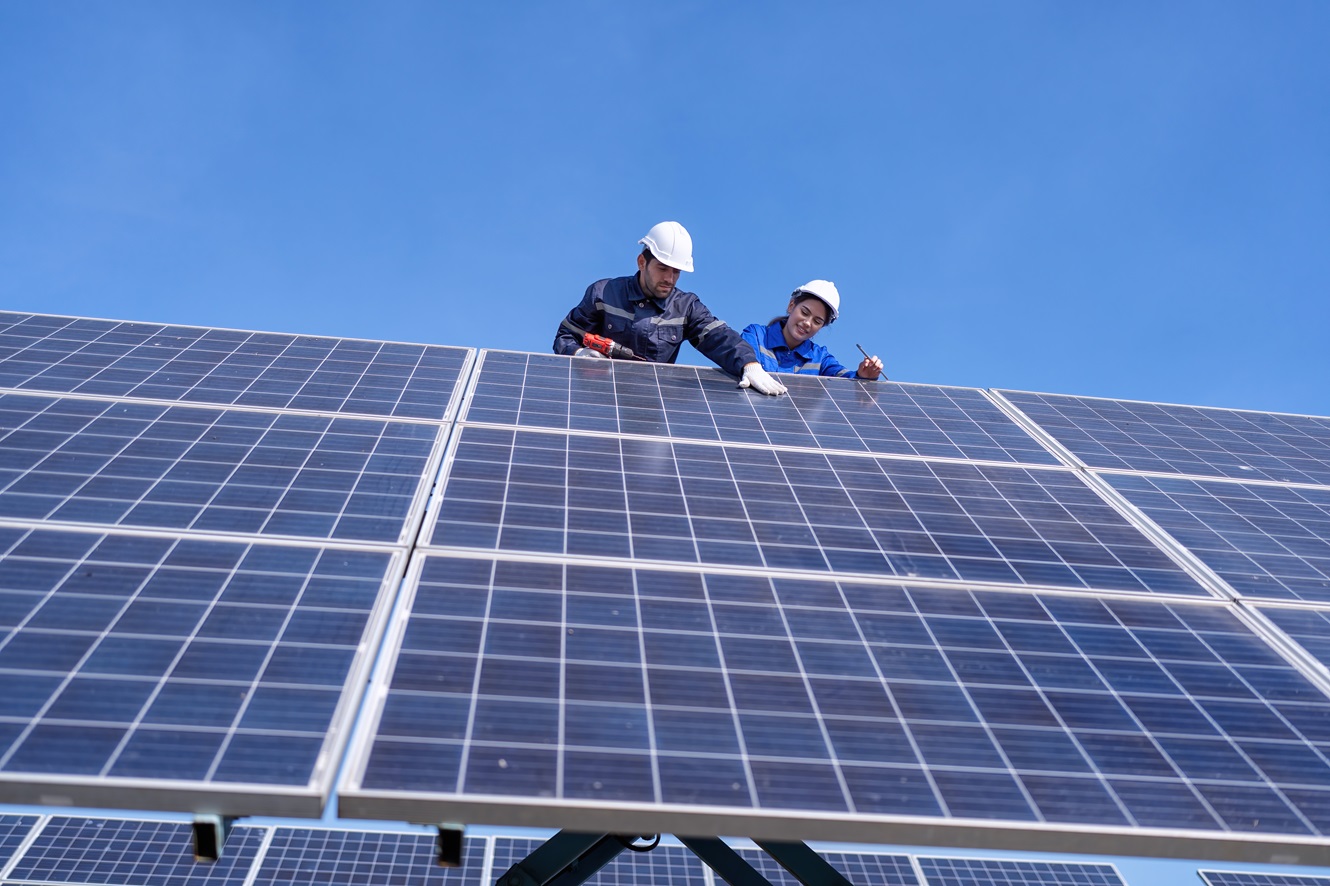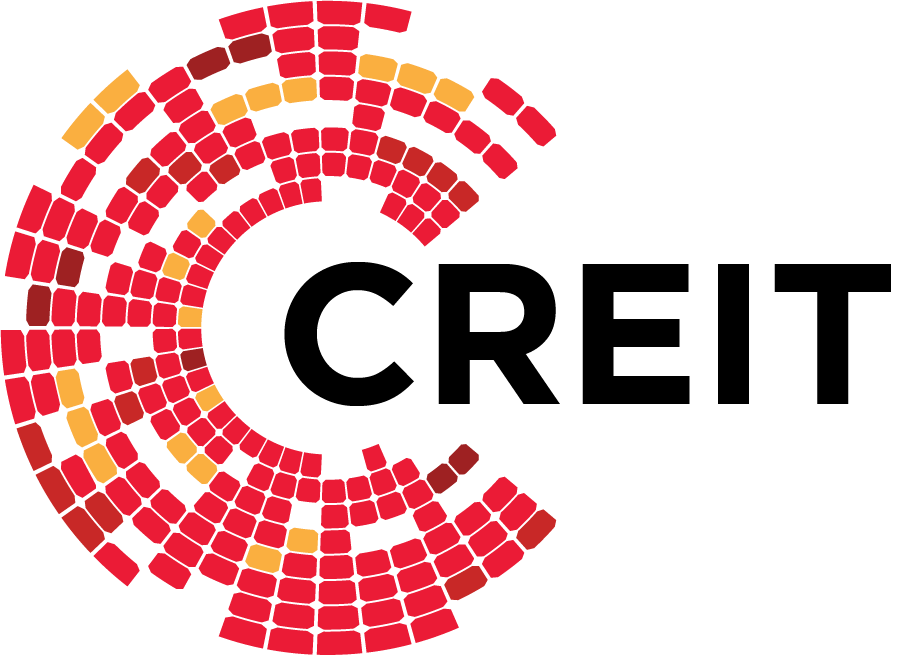In the dynamic landscape of global investments, real estate is one of the few sectors that have stayed resilient and promising, especially in the Philippines. For investors seeking growth and stability, the archipelagic nation stands out as an increasingly attractive destination. Moreover, as the demand for secure and lucrative investment options continues to rise, the realm of real estate beckons with unparalleled potential.
In this article, we’ll delve into real estate investment in the Philippines, including its types and how it works. Plus, we’ll share with you the benefits of investing in the Philippine real estate market, as well as tips on how to successfully invest in the industry. Read on!
What is a Real Estate Investment?
Let’s define real estate investment.
Real estate investment is the strategic acquisition, ownership, management, rental, and/or sale of different properties with the primary goal of generating profit. This multifaceted approach to wealth building encompasses a broad spectrum of assets, from residential homes and commercial spaces to undeveloped land and industrial properties. Furthermore, the core objective of real estate investment is to capitalize on the appreciation of property values over time, coupled with potential rental income streams.
Among the renowned forms of investing, real estate investment is considered one of the avenues for wealth accumulation and portfolio diversification. In addition, it's one of the safest methods to increase money due to constant property price increases.
Types of Real Estate Investments
As investors set their sights on the thriving real estate market, it’s crucial to understand the various types of real estate investments. Doing so can empower them to make informed decisions aligned with their financial goals. Let's discover the key types of real estate investments that investors can explore:
1. Residential Real Estate
Residential real estate involves the purchase and management of properties for living purposes. From single-family homes to condominiums and apartments, investing in the residential sector provides opportunities for rental income and potential long-term appreciation.
2. Commercial Real Estate
Investors looking for higher returns often turn to commercial real estate. This sector includes properties used for business purposes, such as office buildings, retail spaces, and industrial properties. The demand for prime commercial spaces in bustling cities including Metro Manila and Cebu can yield lucrative returns.
3. Real Estate Investment Trusts (REITs)
For those seeking a more hands-off approach, REITs provide an opportunity to invest in real estate without direct property ownership. REITs pool funds from multiple investors to invest in income-generating real estate projects, offering dividend income and portfolio diversification.
4. Vacation Rentals
Owning properties in sought-after tourist spots allows investors to capitalize on the demand for short-term accommodations, especially during peak travel seasons. Hence, investing in vacation rentals in popular tourist destinations like the Philippines is a strategic move.
5. Land Development
Participating in land development projects involves purchasing undeveloped land and enhancing its value through construction projects. This can range from residential subdivisions to commercial complexes, offering investors the potential for substantial returns upon completion.

How Does Real Estate Investing Work?
Now, for investors eyeing the opportunities in the real estate market, understanding how real estate investing works is the first step to unlock its full potential. Continue reading on to know its mechanics and the actionable insights tailored to the dynamic landscape of the Philippines.
1. Market Research and Analysis
Before penetrating the real estate market, investors with investment savvy conduct thorough research to identify lucrative opportunities. This involves assessing market trends, property values, and the economic landscape, as well as factors such as urbanization, infrastructure development, and tourism that are vital in shaping the market.
2. Financial Planning and Budgeting
Successful real estate investment hinges upon strategic financial planning. Investors need to set clear goals, determine their budget, and secure financing if necessary. In several countries experiencing economic growth, financial institutions offer a range of mortgage and financing options to facilitate property acquisition.
3. Property Selection and Due Diligence
Selecting the right property is a critical aspect of real estate investment. Investors must consider factors such as location, property type, and potential for appreciation. On the other hand, due diligence, including property inspections, title verification, and understanding zoning regulations, is imperative to mitigate risks associated with the chosen investment.
4. Rental Income and Property Management
For those eyeing rental income, effective property management is key. This involves setting competitive rental rates, screening tenants, and ensuring the property is well-maintained. The demand for rental properties remains high in key cities, providing a steady income stream for investors.
5. Market Trends and Adaptability
Keeping abreast of the market trends and being adaptable are important for long-term success. The real estate landscape in the Philippines is dynamic, with emerging trends such as sustainable development and the rise of coworking spaces influencing investment decisions. Investors who embrace innovation and evolving market demands stand to reap substantial rewards.
6. Exit Strategies and Portfolio Diversification
Real estate investment is a long-term endeavor, but having exit strategies is essential. Investors should be prepared to sell, reinvest, or adapt their strategies based on changing market conditions. Meanwhile, portfolio diversification, including exploring different property types or geographical locations, adds a layer of risk mitigation and potential for higher returns.
Why Consider Real Estate Investment in the Philippines?
The Philippines emerges as a compelling destination for real estate investment. Boasting of a robust economy, a burgeoning middle class, and a strategic geographical location in Southeast Asia, the archipelagic nation presents a myriad of opportunities that make it an attractive choice for discerning investors. Below are some of the key reasons you should consider real estate investment in the Philippines.
1. Economic Growth and Stability
The Philippines has consistently showcased impressive economic growth, complemented with factors such as a young and skilled workforce, robust remittances from overseas Filipinos, and strategic government initiatives. This economic stability contributes to a favorable environment for real estate investment, with the potential for property appreciation and sustained demand.
2. Rapid Urbanization and Infrastructure Development
Urbanization is transforming different cities in the Philippines, thereby driving demand for residential and commercial properties. Government initiatives focusing on infrastructure development, such as the Build Better More Program, further improve the attractiveness of real estate investment. Regions such as Metro Manila and Cebu are witnessing substantial growth, thus creating opportunities for investors.
3. Tourism Boom and Vacation Rental Potential
With its breathtaking beaches, cultural heritage, and vibrant cities, the Philippines is becoming an increasingly popular tourist destination. Investors can tap into the thriving tourism industry by investing in vacation rentals. The demand for short-term accommodations in tourist hotspots provides a lucrative avenue for generating rental income.
4. Strategic Geopolitical Location
Situated at the crossroads of Asia, the Philippines serves as a gateway to the region. Its strategic location enhances its appeal for businesses, expatriates, and investors. The geopolitical advantage positions the country as a hub for trade and commerce, contributing to the overall growth of its real estate market.

Basic Tips for Investing in Real Estate in the Philippines
Embarking on a real estate investment in the Philippines requires strategic approach and a keen understanding of the market dynamics. Hence, whether you're a seasoned investor or a newcomer to the world of property investment, these essential tips will guide you in making informed decisions in this dynamic market.
1. Conduct thorough market research
Before committing to any investment, conduct comprehensive market research. This involves analyzing trends, studying property values, and gaining insights into the economic landscape.
2. Understand regulatory landscape.
As you pursue real estate investment in the Philippines, familiarize yourself with local regulations governing real estate transactions and stay updated on policies, taxes, and legal requirements. While the Philippine government offers incentives for investors, compliance is nonetheless crucial for a smooth investment process.
3. Identify strategic location.
The importance of location cannot be overstated. Invest in areas with potential for growth and development. Urban centers, areas undergoing infrastructure projects, and popular tourist destinations present opportunities for high returns.
4. Diversify your portfolio.
Explore different types of real estate investments to mitigate risk and optimize returns. You may consider a mix of residential, commercial, and potentially vacation rental properties.
5. Network and seek professional advice.
Build a network within the real estate industry by engaging with professionals such as real estate agents, lawyers, and financial advisors. Seeking expert advice when you plan to embark on real estate investment in the Philippines can provide valuable insights and ensure a smoother investment process.

Invest with CREIT's Reliable and Sustainable Renewable Energy REIT
As we explore the dynamic realm of real estate investment in the Philippines, it's essential to spotlight innovative opportunities that align with both financial success and sustainable development. One such avenue that stands out are REITs, with a focus on renewable energy, exemplified by the cutting-edge offerings of Citicore Energy REIT Corp. (CREIT).
Investing in CREIT goes beyond traditional real estate portfolios. We specialize in renewable energy to promote sustainability and environmental consciousness. And by supporting clean energy initiatives, investors contribute to a greener future while enjoying the benefits of a reliable income stream.
In addition to traditional real estate assets, investing in renewable energy assets offers a resilient and innovative dimension to your investment strategy. Diversifying into the renewable energy sector hedges against market volatility and positions your portfolio for long-term growth. Furthermore, it positions investors to capitalize on the growing demand for clean and efficient energy solutions.
As we discover the multifaceted opportunities in the Philippine real estate market, CREIT emerges as a beacon of sustainable innovation. By investing with CREIT, you not only position yourself for financial success but also contribute to a cleaner, greener future. Explore the possibilities at CREIT and join us in shaping a sustainable tomorrow through innovative and responsible real estate investment.


